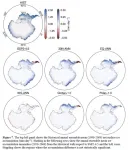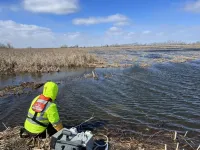(Press-News.org) In China, there is an old saying: "Don't let your children lose on the starting line." It highlights parents' desire to jumpstart their child's early development. Especially in recent years, parents have become increasingly anxious about their children's education, making it a trend to encourage children to participate in extracurricular activities from an early age. But is participating in extracurricular classes always advantageous for young children?
Recently, a study published in the Journal of School Psychology found that extracurricular activities don't always improve a child's skills or behaviour.
The study was led by Dr Lixin Ren, an associate professor in the Academy of Future Education at Xi'an Jiaotong-Liverpool University, China. She says: "Children's ability to manage and regulate their behaviour, and their attitude to learning, can affect the outcome of extracurricular activities. And the outcome depends on the range of activities, as well as the intensity – how often and for how long they take part."
Dr Ren says: "I observed that many parents invest a significant amount of their family's financial resources in extracurricular activities for preschool children. Therefore, I wanted to use scientific research to explore the role of these activities in child development and whether they are truly needed for young children."
Focusing on behaviour
A child's mathematical ability is often a major concern for Chinese parents. Dr Ren's study looked at how extracurricular activities affected maths skills in 317 preschool children in Shanghai, China, between the ages of 3 and 6.
The team found that the impact of extracurricular activities on children was dependent on several factors, particularly their behavioural regulation abilities and approaches to learning.
Dr Ren explains: "Essential behavioural regulation skills include focusing and maintaining attention on tasks, following instructions, tuning out irrelevant information, and inhibiting inappropriate actions. Approaches to learning describe a child's initiative, persistence, curiosity, and motivation in learning situations.
"We found that for children with poor behavioural regulation or less positive approaches to learning, actively participating in a wide range of activities can improve their early mathematical skills.
"This may be because children with poorer self-regulation skills require structured, organised, and managed learning environments. However, for children with good behavioural regulation or positive approaches to learning, the effects of extracurricular activities are not significant," continues Dr Ren.
She further elaborates: "In terms of the intensity of extracurricular activities, for children with poor self-regulation skills, participating in extracurricular activities for long hours each day is detrimental to their development of mathematical ability. Even for children with good self-regulation skills, positive effects gradually turn into negative influences after reaching a certain peak level of participation. In this study, the threshold was 9.08 hours a week. However, this threshold cannot be used as a definitive cut-off, as more studies are needed to understand if this is representative of the whole population."
It is worth noting that the study also found that extracurricular activities have a limited positive impact on children's Chinese word reading and vocabulary comprehension. Dr Ren says, "This may be due to the different cognitive resources required for mathematics and language, with mathematics requiring more formal teaching settings and intensity, while language comprehension occurs more in informal interpersonal communication."
Offering alternatives
Dr Ren hopes that parents will not overly rely on the impact of extracurricular activities and avoid excessive anxiety over their children's development. She provided some suggestions for parents.
"If you find that your child has poor self-regulation skills, you could let them try a larger variety of extracurricular activities to find their interests," she says. "You can also engage in more family-inclusive educational activities to increase interaction with your children."
She also notes: "The relationship between children's engagement in educational activities and academic readiness varies depending on their self-regulation and approaches to learning. Therefore, instructors of extracurricular activities should use developmentally appropriate methods to provide educational activities for young children, such as creating interactive and responsive environments and allowing flexibility in adjusting the curriculum.
"The designers of educational activities need to consider the individual characteristics of each child to ensure that every child benefits from participation," says Dr Ren.
Although current research mainly focuses on extracurricular educational activities, the findings from this study also have important implications for schools.
Dr Ren says: "In China, many early childhood education activities are provided by commercial organisations, which adds to the cost and travel time for families.
"Most children in China are overscheduled nowadays. Perhaps children should be allowed more free time instead of having to attend more structured activities."
END
Do extracurricular activities always give children a head start? Research says maybe not
A study has found that extracurricular activities don't always improve a child's skills or behavior
2023-11-15
ELSE PRESS RELEASES FROM THIS DATE:
$3.37 million NIH grant backs effort to optimize online obesity programs for rural residents
2023-11-15
University of Virginia School of Medicine public health researchers, together with colleagues at the University of South Carolina, have received a $3.37 million grant from the National Institutes of Health to determine if online behavioral weight-management programs for rural residents can be improved by adding a human touch.
Online obesity programs have typically failed to yield the same benefits as in-person programs, the researchers note, so they will test three approaches to add human involvement. More than 600 volunteer participants will be enrolled in a core online 24-week weight-loss ...
The American Pediatric Society names Dr. Rachel Katzenellenbogen as the recipient of the 2024 Norman J. Siegel New Member Outstanding Science Award
2023-11-15
The American Pediatric Society (APS) is pleased to announce Rachel Katzenellenbogen, MD, as the 2024 Norman J. Siegel New Member Outstanding Science Award recipient for her considerable contributions to pediatric science. The award will be presented to Dr. Katzenellenbogen during the APS Presidential Plenary at the Pediatric Academic Societies 2024 Meeting.
The award was created in honor of one of the world’s leading nephrologists, Norman J. Siegel, MD, FASN. Dr. Siegel was an outstanding teacher and mentor, nurturing the early careers of numerous fellows and residents. He was a leader within the medical community and educated the ...
Climate engineering could slow Antarctic ice loss, study shows
2023-11-15
Scattering sunlight-reflecting particles in the atmosphere could slow rapid melting in West Antarctica and reduce the risk of catastrophic sea-level rise, according to a study led by Indiana University researchers.
The study, one of the first to look at how climate engineering might impact Antarctica, comes as scientists sound the alarm over the increasing likelihood of accelerated ice loss in West Antarctica this century. The work appears in the Journal of Geophysical Research: Atmospheres.
“Even if the world meets the ambitious target of limiting global warming to 1.5 degrees Celsius above pre-industrial levels — which we are not on track ...
New report outlines microbial solutions to mediate methane emissions
2023-11-15
Washington, D.C.—The American Academy of Microbiology, the scientific think tank and honorific leadership group at the American Society for Microbiology (ASM), has released a new report, The Role of Microbes in Mediating Methane Emissions. The report highlights recommendations to further the scientific community’s understanding of microbial processes of methane production and consumption to mitigate methane emissions and address climate change.
Microbes can influence climate change through biogeochemical cycles that ...
NYU Tandon takes a quantum leap with new minor
2023-11-15
NYU Tandon School of Engineering is poised to become one of an extremely select group of American universities offering an undergraduate program in quantum technology, situating it at the forefront of a fast-growing field in which high employer demand significantly outpaces available talent.
Beginning in the spring 2024 semester, NYU Tandon students can start earning credits towards the new quantum tech minor, offered through the Department of Applied Physics.
In the past decade, quantum technology – the use of ...
Stand Up To Cancer announces three teams focused on gastroesophageal cancer
2023-11-15
LOS ANGELES – Nov. 15, 2023 – Stand Up To Cancer® (SU2C) today announced three Research Teams focused on bringing new therapies to clinical trials for the treatment of gastroesophageal cancer (GEC). The Research Teams, a part of a Dream Team Collective supported by the Torrey Coast Foundation, will unite top researchers from 11 institutions to address critical problems in GEC prevention, diagnosis and treatment. The Dream Team Collective aims to foster new and inclusive cancer research on the causes and treatments of GEC, mentor a new generation of scientists focused on GEC, bring ...
Should a hospital invest toward specializing in an area? Or diversify? The impact of a hospital’s portfolio strategy on patient demand
2023-11-15
Researchers from Indiana University and Texas Christian University published a new Journal of Marketing study that examines the impact of a hospital’s portfolio strategy on patient demand.
The study, forthcoming in the Journal of Marketing, is titled “Hospital Portfolio Strategy and Patient Choice” and is authored by Sarang Sunder and Sriram Thirumalai.
Structural changes in the healthcare industry (e.g., the institution of the Affordable ...
Surveilling wetlands for infectious bird flu — and finding it
2023-11-15
Recently, morning omelets and holiday dinners have gotten more expensive. One likely cause is bird flu, outbreaks of which led to the deaths of millions of chickens and turkeys from infection or culling in 2022, according to the U.S. Department of Agriculture, and which still demands rigorous monitoring of wild populations. Now, reporting in Environmental Science & Technology Letters, researchers have developed a method that detected infectious bird flu virus in wetlands frequented by waterfowl.
Wild birds represent a significant reservoir of avian influenza ...
Not so silver lining: Microplastics found in clouds could affect the weather
2023-11-15
From the depths of the seas to snow on mountains and even the air above cities, microplastics are turning up increasingly often. Now, in ACS’ Environmental Science & Technology Letters, researchers have analyzed microplastics in clouds above mountains. They suggest that these tiny particles could play a role in cloud formation and, in turn, affect weather.
Microplastics — plastic fragments smaller than five millimeters — originate from a myriad of items used daily, such as clothing, packaging and car tires. As research in the field evolves, scientists are not only detecting microplastics in the atmosphere but also investigating how they may play a role in cloud formation. ...
Association of molecular subtypes in bladder cancer with response to neoadjuvant chemotherapy, progression, and survival
2023-11-15
Considering the molecular subtype of muscle-invasive bladder cancer (MIBC) based on differences in tumor RNA expression can improve the ability of an existing tumor biomarker such as the COXEN score to predict which patients’ tumors are likely to respond to chemotherapy given before surgery. Individual molecular subtypes, however, were not associated with significant differences in patients’ overall survival (OS) or progression-free survival (PFS) times.
Those are the conclusions from a secondary analysis of data from the S1314 clinical trial, a large study in patients with MIBC that was conducted by the SWOG Cancer Research Network, a clinical trials group funded by ...
LAST 30 PRESS RELEASES:
Ketamine high NOT related to treatment success for people with alcohol problems, study finds
1 in 6 Medicare beneficiaries depend on telehealth for key medical care
Maps can encourage home radon testing in the right settings
Exploring the link between hearing loss and cognitive decline
Machine learning tool can predict serious transplant complications months earlier
Prevalence of over-the-counter and prescription medication use in the US
US child mental health care need, unmet needs, and difficulty accessing services
Incidental rotator cuff abnormalities on magnetic resonance imaging
Sensing local fibers in pancreatic tumors, cancer cells ‘choose’ to either grow or tolerate treatment
Barriers to mental health care leave many children behind, new data cautions
Cancer and inflammation: immunologic interplay, translational advances, and clinical strategies
Bioactive polyphenolic compounds and in vitro anti-degenerative property-based pharmacological propensities of some promising germplasms of Amaranthus hypochondriacus L.
AI-powered companionship: PolyU interfaculty scholar harnesses music and empathetic speech in robots to combat loneliness
Antarctica sits above Earth’s strongest “gravity hole.” Now we know how it got that way
Haircare products made with botanicals protects strands, adds shine
Enhanced pulmonary nodule detection and classification using artificial intelligence on LIDC-IDRI data
Using NBA, study finds that pay differences among top performers can erode cooperation
Korea University, Stanford University, and IESGA launch Water Sustainability Index to combat ESG greenwashing
Molecular glue discovery: large scale instead of lucky strike
Insulin resistance predictor highlights cancer connection
Explaining next-generation solar cells
Slippery ions create a smoother path to blue energy
Magnetic resonance imaging opens the door to better treatments for underdiagnosed atypical Parkinsonisms
National poll finds gaps in community preparedness for teen cardiac emergencies
One strategy to block both drug-resistant bacteria and influenza: new broad-spectrum infection prevention approach validated
Survey: 3 in 4 skip physical therapy homework, stunting progress
College students who spend hours on social media are more likely to be lonely – national US study
Evidence behind intermittent fasting for weight loss fails to match hype
How AI tools like DeepSeek are transforming emotional and mental health care of Chinese youth
Study finds link between sugary drinks and anxiety in young people
[Press-News.org] Do extracurricular activities always give children a head start? Research says maybe notA study has found that extracurricular activities don't always improve a child's skills or behavior




